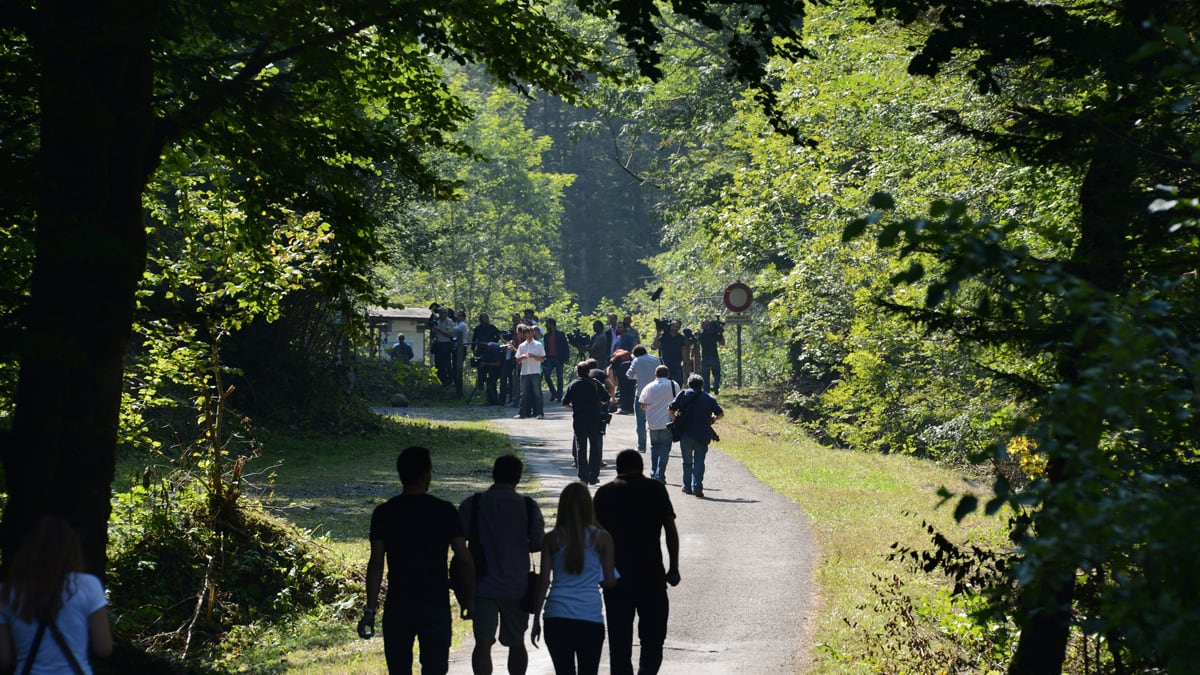The mystery remains entire, in the French parlance, as authorities on Friday continued their investigation into shooting deaths of a British family and a local cyclist on a mountain road in the French Alps. But as France opens a formal inquiry into the gruesome quadruple murder, sending its own investigators to Britain and awaiting the results of autopsies, new lines of inquiry are earning attention on both sides of the Channel. In particular, a family feud between an Iraqi-born British victim and his brother.
Three bodies were discovered Wednesday in an idling BMW and a fourth, a cyclist, beside the car in an isolated clearing near the village of Chevaline in the hills above Lake Annecy. Two small girls— Zaïma, a 7-year-old who suffered severe head injuries at the hands of a mystery assailant, and Zeena, 4, found inside the car eight hours after authorities were called to the scene—are under police protection. Police said the youngest girl was able to confirm Friday that the car’s driver and a woman in the backseat were her parents, Baghdad-born Briton Saad al-Hilli, 50, and his wife, Iqbal, even as British and French media have been staking out the Al-Hilli home in Claygate, Surrey, southwest of London.
Police said the 4-year-old did not confirm that an older woman discovered dead in the backseat was her maternal grandmother, as has been presumed, although authorities have confirmed that woman held a Swedish passport and was also of Iraqi origin. Authorities on Thursday said Al-Hilli had lived in Britain since at least 2002, although one widely cited Agence France Presse source claims the man, thought to be an engineer, came to Britain with his family as a teenager in the 1970s.
The foreign victims are being treated by French authorities as British and Swedish citizens, respectively, not as Iraqi nationals. Still, Annecy Public Prosecutor Eric Maillaud in a press conference on Friday conceded, in response to a question following up on rumors that Al-Hilli had once been under British counter-terror surveillance, that the car-owner’s Iraqi origins initially stood out. “As it is, our information, on the French side, on the English side: Totally unknown in regards to terrorism, anti-terrorism,” said Maillaud. “‘Born in Iraq,’ we all thought about it instantaneously, [but he is] totally unknown to the specialized services on the British side, on the French side, that work on those issues.”
A French gendarme on the case has been dispatched to London, where he will be joined by three additional French investigators.
Neither orphaned child has yet been able to provide useful information regarding the attack itself, authorities said. The older girl, who suffered skull fractures and a gunshot wound to the shoulder, remains in a medically induced coma and has endured multiple surgeries; authorities will wait for a green light from medical staff before questioning her. Maillaud told the TF1 national news broadcast on Thursday evening that the youngest child, given her age, could not at this point be considered “a key witness.”
All the victims were shot at least three times, each at least once in the head, while police found 25 shell casings at the scene. The murdered cyclist, Sylvain Mollier, 45, from the nearby village of Ugine, was reportedly shot five times. French media claimed Mollier was on parental leave after the birth of his third child two months ago. Authorities said it is most likely that he was merely in the wrong place at the wrong time.

Public Prosecutor Maillaud has indicated that the investigation would take seriously, among other lines of inquiry, the allegation that Al-Hilli and his brother had been embroiled in a financial dispute. “It seems there was a dispute about money. It is a piece of information that seems serious, that comes from the British police. The brother must be heard at length,” he told reporters on Friday. Al-Hilli’s brother visited a British police station on Thursday, unbidden, after hearing a TV report that his brother had been murdered in France. French authorities say Al-Hilli’s brother, being named by media as Zaïd, visited British police again on Friday to deny widespread reports that he was in conflict with Saad Al-Hilli.
Indeed, French radio station RMC on Friday morning aired an interview with a man, also named Zaïd, claiming to be a family friend who studied dentistry with Saad Al-Hilli’s wife, Iqbal, in Iraq before moving to Claygate himself. “There is an issue with inheritance,” the family friend alleged on RMC, between the brothers following their father’s death last year. “There are lots of properties involved, in Spain, in France, in Switzerland, and Iraq,” he said, claiming the brothers were no longer on speaking terms and suggesting the fraternal dispute be taken into account in investigating murders he surmised were targeted.
Maillaud, meanwhile, urged restraint from observers. He said Saad Al-Hilli’s brother would eventually be questioned, but as a witness—implying that he wasn’t at this point a suspect. “It isn’t because someone says there is a dispute between two brothers that he is necessarily the prime suspect in the murder, with bullets to the head, of an entire family,” Maillaud argued.
Another purported witness has featured heavily in French coverage of the massacre. Sylvie Lecoeur, a local woman, has told reporters that she was nearly hit by a white car traveling at great speed on a bend at the Chevaline village limits on Wednesday afternoon, around the time of the massacre. “He was completely in panic and gave the impression he no longer had any control of his vehicle,” she said of the driver on France’s BFMTV. Elsewhere, the same woman described the man as having brown hair, relatively fair skin, and wearing a black shirt, perhaps Polo-style. But authorities would only say that they had received many tips about a variety of vehicles in the area on Wednesday.
Meanwhile, the cyclist and former Royal Air Force member who discovered the murder scene on Wednesday has told police he saw a green SUV and a motorcycle traveling on the road leading away from the scene before he reached it. But the Annecy public prosecutor stressed that SUVs were especially common in this mountainous region of France and that this particular vehicle sighting—the make and model of which was unknown—was not being treated as a key element of the inquiry. The cyclist did not report hearing any gunshots in the moments before he came across the Al-Hillis’ bullet-riddled burgundy station wagon.
On Friday morning, French Interior Minister Manuel Valls on RTL radio dismissed accusations of incompetence leveled at police—in particular by British media—after the delayed discovery of the 4-year-old girl, found hidden under a dead woman’s skirt in the backseat eight hours after the murders were initially reported. “I will not participate in this useless and unjustified polemic,” said Valls. “I think that there was no fault.”






